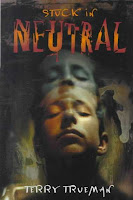
Mrs. Duell challenged all the RB teachers to identify their favorite book that they read this past year (don't you just love all the end-of-the-year Best-Of lists?) Believe it or not, I have kept track of all the books I've read this year (and the movies and plays I've seen -- what a nerd, right?) But that list is at home. Nevertheless, it took me only a moment to think of my favorite. The Thirteenth Tale, by Diane Setterfield, was at the very top of a long list of great books that I met this past year. It had suspense, drama, well-developed interesting characters, humor, pathos, and a satisfying ending. It was very well written, which captured my admiration -- it's fun to observe how an author structured a book, and to be still surprised by wonderful turns of phrase, delightful word choices, gorgeous passages... So - what it's about - - - Margaret Lea works at her father's rare book shop and hides the pain of her knowledge that her conjoined twin sister died on the day they were born, in the very operation that saved Margaret's life. After she wrote a biography that reveals her understanding of sibling (and specifically twin) relationships, she was contacted by reclusive author Vida Winter to write her biography. Miss Winter has spent a lifetime telling various biographers varying fantastic stories - but she vows that THIS time she'll tell the truth. Margaret combines interviews of Miss Winter with independent investigations. Vida tells about the once-proud Angelfield family from Yorkshire, who lived in an estate now fallen to ruins. There was eccentric and seductive Isabelle, her sadistic brother Charlie, and Isabella’s oddly disturbing twin daughters Adeline and Emmeline. A governess, a doctor, a few devoted servants, an abandoned baby, and a streak of madness and murder run through Angelfield. What do these characters have to do with Vida Winter? Finding out will keep you pasted to the pages of this wonderful novel. Grab it for a cold winter's day -- or couple of days. I guarantee you won't be able to put it down.
4 out of 4 stars












